The Patrick Hamilton Appreciation Society discussion

This topic is about
Julian Maclaren-Ross
Hamilton-esque books, authors..
>
Julian Maclaren-Ross

Here's a review that I wrote in June 2012, and posted to Goodreads, about Of Love and Hunger. Needless to say I couldn't resist a reference to Patrick Hamilton...
I came to this book having read Paul Willetts's biography of Soho legend, Julian Maclaren-Ross, "Fear and Loathing in Fitzrovia". His was a hand to mouth existence, and - for anyone interested in the 1940s, and literary London - is well worth reading.
"Of Love and Hunger", Maclaren-Ross’s first full length novel, draws on his own experiences of living in Bognor Regis and working for Electrolux in Hove as a door to door vacuum salesman. In common with Patrick Hamilton, this is a world of casual work, drinkers, hardship and boarding-houses.
The story takes place during 1939. War looms and Maclaren-Ross evokes the sense of impending doom and transience. I really enjoyed it. Well observed characters populate the main story of a doomed love affair, that also features pettiness, snobbery, fascism, misanthropy, and humour. Whilst not quite up there with Hamilton's "Hangover Square" or "Slaves Of Solitude" (let's face it - what is?), it is nonetheless a compelling, enjoyable read filled with great period detail. The short epilogue, three years on from the main story, beautifully brings together the threads of the ensuing War and the personal lives of the main characters. A minor classic.
After reading this, I am really looking forward to the two other books by Julian Maclaren-Ross that I also purchased off the back of "Fear and Loathing in Fitzrovia" - "Selected Stories" and "Memoirs of the Forties".
 I have read about Julian Maclaren Ross, and heard part of one of his stories on R4. I am extremely keen to read him -- and about him, but have not been able to find any ebook versions of his books. Did you know that J Maclaren Ross was the inspiration for the character of X Trapnel in Dance to the Music of Time by Anthony Powell, who I think was a close friend of JMR?
I have read about Julian Maclaren Ross, and heard part of one of his stories on R4. I am extremely keen to read him -- and about him, but have not been able to find any ebook versions of his books. Did you know that J Maclaren Ross was the inspiration for the character of X Trapnel in Dance to the Music of Time by Anthony Powell, who I think was a close friend of JMR?
Fionaonaona wrote: "Did you know that J Maclaren Ross was the inspiration for the character of X Trapnel in Dance to the Music of Time by Anthony Powell? "
Hi Fionaonaona, yes I did know that JMR inspired X Trapnel. I've never read A Dance to the Music of Time: 1st Movement. It looks like quite an undertaking. Should I be setting aside time to read it?
Fionaonaona wrote: "Anthony Powell, was, I think a close friend of JMR? "
They certainly knew each other. I don't think they were close friends. JMR really only had a handful of close friends throughout his life - but plenty of acolytes at the Wheatsheaf pub in Fitzrovia, London where he was a fixture, holding court night after night to a host of mesmerised listeners as he renacted scenes from favourite films, talked of future writing projects and inveighed against the crimes and shortcomings of publishers.
Dan Davin described Julian's routine thus "Midday in the pub till closing time, a late lunch at the Scala restaurant in Charlotte Street, roast beef with as much fat as possible and lashings of horse-radish sauce. A stroll to look at the bookshops in Charing Cross Road and to buy Royalty, his special jumbo-sized American cigarettes. Opening time again at the Wheatsheaf till closing time. A hurried dash to the Highlander which closed half an hour later. Back to the Scala for supper and coffee. At midnight the tube home from Goodge Street, where a mad blonde known as the Goodge Street Whore lurked in ambush, convinced he was a homo and therefore a blackleg, and waiting to rave insults until the train bore us away."
What a life. What this account doesn't mention is that after a day of carousing JMR would neck a few prescription amphetamines to allow him to write through the night. Usually articles and commissions to get enough cash to see him through the next few days.
Hi Fionaonaona, yes I did know that JMR inspired X Trapnel. I've never read A Dance to the Music of Time: 1st Movement. It looks like quite an undertaking. Should I be setting aside time to read it?
Fionaonaona wrote: "Anthony Powell, was, I think a close friend of JMR? "
They certainly knew each other. I don't think they were close friends. JMR really only had a handful of close friends throughout his life - but plenty of acolytes at the Wheatsheaf pub in Fitzrovia, London where he was a fixture, holding court night after night to a host of mesmerised listeners as he renacted scenes from favourite films, talked of future writing projects and inveighed against the crimes and shortcomings of publishers.
Dan Davin described Julian's routine thus "Midday in the pub till closing time, a late lunch at the Scala restaurant in Charlotte Street, roast beef with as much fat as possible and lashings of horse-radish sauce. A stroll to look at the bookshops in Charing Cross Road and to buy Royalty, his special jumbo-sized American cigarettes. Opening time again at the Wheatsheaf till closing time. A hurried dash to the Highlander which closed half an hour later. Back to the Scala for supper and coffee. At midnight the tube home from Goodge Street, where a mad blonde known as the Goodge Street Whore lurked in ambush, convinced he was a homo and therefore a blackleg, and waiting to rave insults until the train bore us away."
What a life. What this account doesn't mention is that after a day of carousing JMR would neck a few prescription amphetamines to allow him to write through the night. Usually articles and commissions to get enough cash to see him through the next few days.
 Olivia Manning said that Prince Yakimov was based on Julian Maclaren-Ross as well (although that portrait is not a particularly flattering one).
Olivia Manning said that Prince Yakimov was based on Julian Maclaren-Ross as well (although that portrait is not a particularly flattering one).He has had a few mentions in some memoirs and biographies I have read and seems to have known a lot of people. Perhaps he was someone who had many acquaintances but few close friends.
Val wrote: "Perhaps he was someone who had many acquaintances but few close friends. "
That's certainly the impression I came away with after reading the Paul Willetts biography. He had to be the centre of attention. I have no doubt he would have been an amazing character to spend time with, but perhaps not the most reliable friend. That said, when he was in the money (increasingly rare as he got older) he was a generous man. Definitely a live for the moment individual. The biography is well worth a read. I would love to have been able to see him in his forties pomp.
That's certainly the impression I came away with after reading the Paul Willetts biography. He had to be the centre of attention. I have no doubt he would have been an amazing character to spend time with, but perhaps not the most reliable friend. That said, when he was in the money (increasingly rare as he got older) he was a generous man. Definitely a live for the moment individual. The biography is well worth a read. I would love to have been able to see him in his forties pomp.
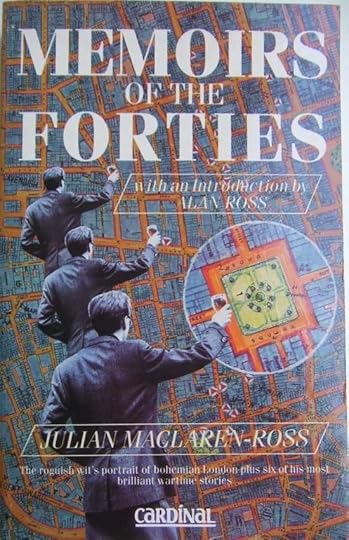
Here's a review of Memoirs Of The Forties by Julian Maclaren-Ross, that I wrote after reading it in August 2012.
Another winner from JMR. I'd previously read his novel 'Of Love And Hunger' and, prior to that, Paul Willetts's biography "Fear and Loathing in Fitzrovia". His was a hand to mouth existence, and - for anyone interested in the 1940s, and literary London - this biography is well worth reading.
This is probably not the ideal entry point. I'd recommend 'Of Love And Hunger' first, and then Paul Willetts's biography, by which time you'll be hooked and quite possibly do what I did, which is go online and buy every title you can lay your hands on. Alas, there's precious few of them.
His Memoirs of the Forties are highly readable and evoke a long lost era. In common with 'Of Love And Hunger', JMR uses informal, colloquial language to bring his stories to life. This really is great stuff. Next stop for this confirmed admirer is his 'Selected Stories'.
I have yet to read his 'Selected Stories', though have a copy on my shelf awaiting the right moment.
 A Dance to the Music of Time: 1st Movement. It looks like quite an undertaking. Should I be setting aside time to read it?
A Dance to the Music of Time: 1st Movement. It looks like quite an undertaking. Should I be setting aside time to read it?Yes, you most certainly should! It may look like an undertaking, but I did not find it to be so. I think there are 12 or so volumes and each of them is quite short. I found them very readable and was devastated to reach the last one.
Having said that, I read them almost 30 years ago! So my view may have changed. I would very much like to re-read them.
 Here, then, as threatened, is a [partial] list of recommendations... most of which should do the job of lighting up the lives of any Patrick Hamilton fans. Keep in mind that I'm stateside, so none of these are anywhere near as obvious to me as they probably are to those in the UK.
Here, then, as threatened, is a [partial] list of recommendations... most of which should do the job of lighting up the lives of any Patrick Hamilton fans. Keep in mind that I'm stateside, so none of these are anywhere near as obvious to me as they probably are to those in the UK.Arthur Morrison - 'A Child of the Jago'
Roland Camberton - 'Scamp' and 'Rain On the Pavements'
Norman Collins - 'London Belongs To Me'
Hans Fallada - 'Alone In Berlin'
Emanuel Litvinoff - 'Journey Through a Small Planet'
Alexander Baron - 'King Dido,' 'The Lowlife,' and 'Rosie Hogarth'
Julian Maclaren-Ross - 'Of Love & Hunger,' 'Collected Memoirs,' 'Bitten By The Tarantula & Other Writing' and 'Selected Letters'
Paul Willetts - 'Fear & Loathing in Fitzrovia,' 'North Soho 999,' and 'Members Only'
Colin Wilson - 'Adrift in Soho'
Fionaonaona wrote: "Yes, you most certainly should! It may look like an undertaking, but I did not find it to be so. I think there are 12 or so volumes and each of them is quite short. I found them very readable and was devastated to reach the last one. "
Thanks Fionaonaona - I think that's all the encouragement I need. I had it in my mind that they were quite a tough read, so I am delighted to discover that they are very readable. I generally like epic novels with ambitious scope.
Fionaonaona wrote: "Having said that, I read them almost 30 years ago! So my view may have changed. I would very much like to re-read them. "
I usually find that my taste remains remarkably unchanged when I revisit books I loved decades earlier. Even those books that I loved as a child seem to retain their power and charm.
Thanks Fionaonaona - I think that's all the encouragement I need. I had it in my mind that they were quite a tough read, so I am delighted to discover that they are very readable. I generally like epic novels with ambitious scope.
Fionaonaona wrote: "Having said that, I read them almost 30 years ago! So my view may have changed. I would very much like to re-read them. "
I usually find that my taste remains remarkably unchanged when I revisit books I loved decades earlier. Even those books that I loved as a child seem to retain their power and charm.
Mark wrote: "Arthur Morrison - 'A Child of the Jago'
Roland Camberton - 'Scamp' and 'Rain On the Pavements'
Norman Collins - 'London Belongs To Me'
Hans Fallada - 'Alone In Berlin'
Emanuel Litvinoff - 'Journey Through a Small Planet'
Alexander Baron - 'King Dido,' 'The Lowlife,' and 'Rosie Hogarth'
Julian Maclaren-Ross - 'Of Love & Hunger,' 'Collected Memoirs,' 'Bitten By The Tarantula & Other Writing' and 'Selected Letters'
Paul Willetts - 'Fear & Loathing in Fitzrovia,' 'North Soho 999,' and 'Members Only'
Colin Wilson - 'Adrift in Soho' "
Marvellous stuff Mark.
I only know Norman Collins (and have waxed lyrical on the dedicated thread Click here.); Paul Willetts; and Julian Maclaren-Ross. I will investigate the others. I have read a few books by Colin Wilson, but not Adrift in Soho, which - on the title alone - I feel must be essential.
Roland Camberton - 'Scamp' and 'Rain On the Pavements'
Norman Collins - 'London Belongs To Me'
Hans Fallada - 'Alone In Berlin'
Emanuel Litvinoff - 'Journey Through a Small Planet'
Alexander Baron - 'King Dido,' 'The Lowlife,' and 'Rosie Hogarth'
Julian Maclaren-Ross - 'Of Love & Hunger,' 'Collected Memoirs,' 'Bitten By The Tarantula & Other Writing' and 'Selected Letters'
Paul Willetts - 'Fear & Loathing in Fitzrovia,' 'North Soho 999,' and 'Members Only'
Colin Wilson - 'Adrift in Soho' "
Marvellous stuff Mark.
I only know Norman Collins (and have waxed lyrical on the dedicated thread Click here.); Paul Willetts; and Julian Maclaren-Ross. I will investigate the others. I have read a few books by Colin Wilson, but not Adrift in Soho, which - on the title alone - I feel must be essential.
Fionaonaona wrote: "A Dance to the Music of Time: 1st Movement.
I think there are 12 or so volumes and each of them is quite short."
I was following up on this and notice the edition my library has of Book 1 "Spring" is 736 pages long. I think this is where my impression of it being a big book came from. There's a further three seasons that follow Spring - and a further three books. Still I may get stuck into Spring in August - that doesn't really make sense does it? Does reading each volume in line with the appropriate season work best?
I think there are 12 or so volumes and each of them is quite short."
I was following up on this and notice the edition my library has of Book 1 "Spring" is 736 pages long. I think this is where my impression of it being a big book came from. There's a further three seasons that follow Spring - and a further three books. Still I may get stuck into Spring in August - that doesn't really make sense does it? Does reading each volume in line with the appropriate season work best?
 I think they must have been recently packaged in four volumes, and I assume the reference to seasons relates to seasons of life.
I think they must have been recently packaged in four volumes, and I assume the reference to seasons relates to seasons of life. They were published individually over many years, and I bought them as Fontana paperbacks with Mark Boxer illustrations on the cover.
The individual titles don't incorporate DTTMT which makes searching for them hard. The Wikipedia entry for the series lists the titles - http://en.m.wikipedia.org/wiki/A_Danc... . I imagine you would be able to get second hand ones quite cheaply.
Thanks Fionaonaona. I'll look at the second hand route. That said, I could just get the doorstop out of the library. I notice that Kindle version ares available of each individually but at c£6 each which seems ludicrously expensive relative to other options (but then I often think that about Kindle pricing - preferring to use my Kindle for out of copyright or out of print material). Anyway, thanks again. That's very helpful.
 I'm a fan of Maclaren-Ross and the biography by Willetts is a fantastic read. What a fascinating world London was in the post-war years. Well, come to think of it, almost every decade in London is interesting. Nevertheless what a fantastic landscape London is/was. "Adrift in Soho" by Wilson is a very interesting book.
I'm a fan of Maclaren-Ross and the biography by Willetts is a fantastic read. What a fascinating world London was in the post-war years. Well, come to think of it, almost every decade in London is interesting. Nevertheless what a fantastic landscape London is/was. "Adrift in Soho" by Wilson is a very interesting book.
Tosh wrote: "I'm a fan of Maclaren-Ross and the biography by Willetts is a fantastic read. "
Totally agree.
Tosh wrote: What a fascinating world London was in the post-war years. "
I would love to be able to go back in time and see it for myself. That said, the Willetts biography gives a good sense of that milieu. I have been in The Wheatsheaf a few times too - but not since I became aware of JMR.
Tosh wrote: ""Adrift in Soho" by Wilson is a very interesting book. "
I must read that. I've read a few of his books and they've all been interesting. I read a great biography of him too a few years back - Dreaming To Some Purpose - that is well worth checking out.
Totally agree.
Tosh wrote: What a fascinating world London was in the post-war years. "
I would love to be able to go back in time and see it for myself. That said, the Willetts biography gives a good sense of that milieu. I have been in The Wheatsheaf a few times too - but not since I became aware of JMR.
Tosh wrote: ""Adrift in Soho" by Wilson is a very interesting book. "
I must read that. I've read a few of his books and they've all been interesting. I read a great biography of him too a few years back - Dreaming To Some Purpose - that is well worth checking out.
 Colin Wilson is a real trip. He wrote so MANY books. Especially true crime titles. But yeah I'm interested in his soho years.
Colin Wilson is a real trip. He wrote so MANY books. Especially true crime titles. But yeah I'm interested in his soho years.
Tosh wrote: "Colin Wilson is a real trip. He wrote so MANY books"
Yes, I would struggle to think of anyone who has written more books - though I am sure there are some authors who have.
Interestingly when The Outsider came out, he was considered an important young author and was widely celebrated. He had fun going to lots of literary parties. I think then people would have been amazed at the way his career actually panned out. In some respects he is the ultimate Renaissance Man - the list of things that pique his interest and passion is seemingly endless. He co-writes some books with his son now.
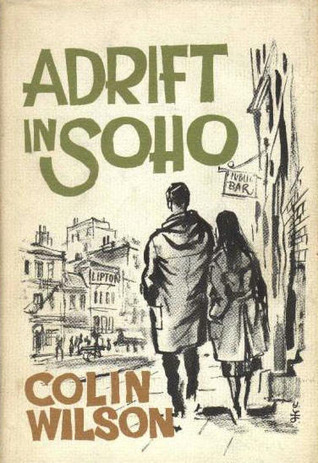
Tosh wrote: "But yeah I'm interested in his soho years."
I will definitely be reading Adrift in Soho very soon, and have just ordered a copy. I love the title. Some editions are subtitled: "Beats, Bums & Bohemians". A good title just got even better.
Yes, I would struggle to think of anyone who has written more books - though I am sure there are some authors who have.
Interestingly when The Outsider came out, he was considered an important young author and was widely celebrated. He had fun going to lots of literary parties. I think then people would have been amazed at the way his career actually panned out. In some respects he is the ultimate Renaissance Man - the list of things that pique his interest and passion is seemingly endless. He co-writes some books with his son now.

Tosh wrote: "But yeah I'm interested in his soho years."
I will definitely be reading Adrift in Soho very soon, and have just ordered a copy. I love the title. Some editions are subtitled: "Beats, Bums & Bohemians". A good title just got even better.
 I am very tempted by Adrift in Soho. I collected Of Love and Hunger and Fear and Loathing in Fitzrovia from the library yesterday afternoon. I'm reading Love and Hunger first and am already really enjoying it. I'm particularly enjoying the writing after my struggle with Twopence Coloured.
I am very tempted by Adrift in Soho. I collected Of Love and Hunger and Fear and Loathing in Fitzrovia from the library yesterday afternoon. I'm reading Love and Hunger first and am already really enjoying it. I'm particularly enjoying the writing after my struggle with Twopence Coloured.
Fionaonaona wrote: "I'm particularly enjoying the writing after my struggle with Twopence Coloured. "
Great news. I think it's a splendid little book. And somewhat Hamilton-esque. I look forward to your thoughts.
Fionaonaona wrote: "I collected ....Fear and Loathing in Fitzrovia from the library yesterday afternoon."
I'm so pleased you tracked it down.
Fionaonaona wrote: "I am very tempted by Adrift in Soho."
Me too. I've got high hopes.
Great news. I think it's a splendid little book. And somewhat Hamilton-esque. I look forward to your thoughts.
Fionaonaona wrote: "I collected ....Fear and Loathing in Fitzrovia from the library yesterday afternoon."
I'm so pleased you tracked it down.
Fionaonaona wrote: "I am very tempted by Adrift in Soho."
Me too. I've got high hopes.
 Re: "Some editions are subtitled: "Beats, Bums & Bohemians". A good title just got even better."
Re: "Some editions are subtitled: "Beats, Bums & Bohemians". A good title just got even better."Sadly, you can blame that on poor design decisions. 'Beatniks, Bums & Bohemians' isn't actually the subtitle, although anyone would be forgiven for thinking that it is. 'Beatniks, Bums & Bohemians' is actually the name of the Five Leaves reissue series that, apart from 'Adrift in Soho,' also includes 'Baron's Court, All Change' by Terry Taylor, 'The Furnished Room' by Laura Del-Rivo, and, I think, a few other titles.
Mark wrote: "'Beatniks, Bums & Bohemians' is actually the name of the Five Leaves reissue series that, apart from 'Adrift in Soho,' also includes 'Baron's Court, All Change' by Terry Taylor, 'The Furnished Room' by Laura Del-Rivo, and, I think, a few other titles. "
Thanks Mark. Even as the name of a series of reissues it hooks me in. Those titles you mention all sound worthy of investigation. Have you read any?
Thanks Mark. Even as the name of a series of reissues it hooks me in. Those titles you mention all sound worthy of investigation. Have you read any?
 I haven't... yet. 'Baron's Court, All Change,' apparently holds the distinction of being the first instance of LSD being mentioned in UK literature.
I haven't... yet. 'Baron's Court, All Change,' apparently holds the distinction of being the first instance of LSD being mentioned in UK literature.
Mark wrote: "I haven't... yet."
Only a matter of time though eh?
Mark wrote: "'Baron's Court, All Change,' apparently holds the distinction of being the first instance of LSD being mentioned in UK literature."
Great claim to fame. I remember hearing George Melly remembering hearing Paul McCartney talking about LSD. Melly assumed it was slang for money (the old UK, pre-decimilisation currency was known as LSD (which was short for pounds, shillings and pence)).
Only a matter of time though eh?
Mark wrote: "'Baron's Court, All Change,' apparently holds the distinction of being the first instance of LSD being mentioned in UK literature."
Great claim to fame. I remember hearing George Melly remembering hearing Paul McCartney talking about LSD. Melly assumed it was slang for money (the old UK, pre-decimilisation currency was known as LSD (which was short for pounds, shillings and pence)).
 I do plan on reading them, but after reading 'Adrift in Soho,' my sense is that I should try to scoop up battered old paperbacks of the other titles. 'Adrift' struck me as a fantastic pulp paperback that lost something in the transformation to shiny new re-publication dressed up as important-yet-forgotten literature. I'm not sure if that sentence makes sense, but I'm pretty sure that you'll understand what I mean after you've read the book.
I do plan on reading them, but after reading 'Adrift in Soho,' my sense is that I should try to scoop up battered old paperbacks of the other titles. 'Adrift' struck me as a fantastic pulp paperback that lost something in the transformation to shiny new re-publication dressed up as important-yet-forgotten literature. I'm not sure if that sentence makes sense, but I'm pretty sure that you'll understand what I mean after you've read the book.
Mark wrote: "I should try to scoop up battered old paperbacks of the other titles. 'Adrift' struck me as a fantastic pulp paperback that lost something in the transformation to shiny new re-publication..."
Yes. Know what you mean. Something like...
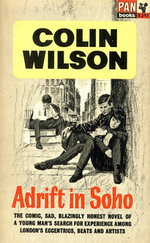


Nigeyb wrote: "Tosh wrote: "Colin Wilson is a real trip. He wrote so MANY books"
Yes, I would struggle to think of anyone who has written more books - though I am sure there are some authors who have. "
List here. Well over a hundred.

Colin Wilson World is well worth a browse.
Yes. Know what you mean. Something like...



Nigeyb wrote: "Tosh wrote: "Colin Wilson is a real trip. He wrote so MANY books"
Yes, I would struggle to think of anyone who has written more books - though I am sure there are some authors who have. "
List here. Well over a hundred.

Colin Wilson World is well worth a browse.
 I finished Of Love and Hunger last week and I just loved it. His writing is so gentle and clever, I couldn't bear for it to end. I would have started it again straight away, if someone else hadn't nabbed it from me.
I finished Of Love and Hunger last week and I just loved it. His writing is so gentle and clever, I couldn't bear for it to end. I would have started it again straight away, if someone else hadn't nabbed it from me. I have read the introduction and a few pages of Fear and Loathing... but I think it is going to take me a long time to get through because it is so large and heavy, I will be limited in when I can read it. If only there was a Kindle edition.
Needless to say, I will now order everything he has written from the library.
Fionaonaona wrote: "I finished Of Love and Hunger last week and I just loved it. His writing is so gentle and clever, I couldn't bear for it to end. "
Hurrah. Another satisfied reader. I completely agree. It's a wonderful book. I know some of the locations in Hove which only added to my enjoyment. I actually went in search of the place where JMR did his training to be a vacuum salesman (which he draws on for the book).
Fionaonaona wrote: "I have read the introduction and a few pages of Fear and Loathing... but I think it is going to take me a long time to get through because it is so large and heavy, I will be limited in when I can read it. If only there was a Kindle edition."
It is a bit cumbersome, but I found easy to read and enjoyable. There is a certain amount of repetition and I had the impression Paul Willetts tended to err on leaving information in. As, like you, I was already smitten this didn't bother me. I look forward to hearing your reaction.
Fionaonaona wrote: "Needless to say, I will now order everything he has written from the library."
It's the only possible reaction that makes any sense.
Hurrah. Another satisfied reader. I completely agree. It's a wonderful book. I know some of the locations in Hove which only added to my enjoyment. I actually went in search of the place where JMR did his training to be a vacuum salesman (which he draws on for the book).
Fionaonaona wrote: "I have read the introduction and a few pages of Fear and Loathing... but I think it is going to take me a long time to get through because it is so large and heavy, I will be limited in when I can read it. If only there was a Kindle edition."
It is a bit cumbersome, but I found easy to read and enjoyable. There is a certain amount of repetition and I had the impression Paul Willetts tended to err on leaving information in. As, like you, I was already smitten this didn't bother me. I look forward to hearing your reaction.
Fionaonaona wrote: "Needless to say, I will now order everything he has written from the library."
It's the only possible reaction that makes any sense.
I visited The Wheatsheaf as part of my walking and drinking tour of Fitzrovia that took place on Saturday 19 October 2013. Click here to see the photos I took. We tried to evoke the spirit of Julian Maclaren-Ross and Patrick Hamilton, amongst others.
The Wheatsheaf - outside view...
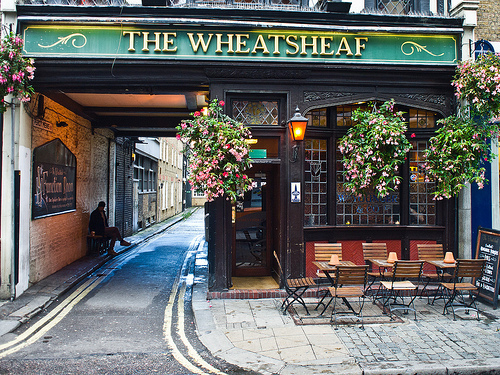
This is the exact spot where Julian Maclaren-Ross held court for so many years in The Wheatsheaf pub...
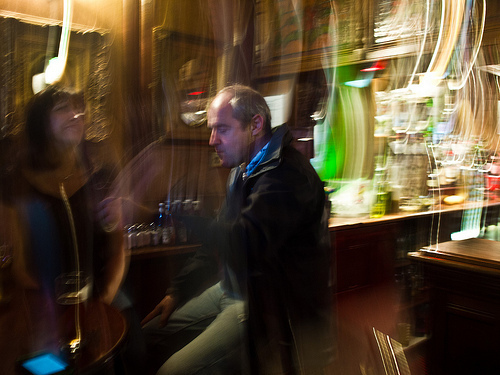
One of the great services Julian Maclaren-Ross renders in his best-known book, Memoirs of the Forties, is to grant life to occupants of his world beyond the numerous noted writers and artists of his acquaintance. So along with Dylan Thomas, Cyril Connolly and Graham Greene, he lends forgotten characters a substance and complexity which elevate them from bit-player status. His sense of colour, back story and telling details are all illustrated in this excerpt, in which describes one of his fellow regulars at the The Wheatsheaf:
Julian Maclaren-Ross and Mrs Stewart's spot in The Wheatsheaf...
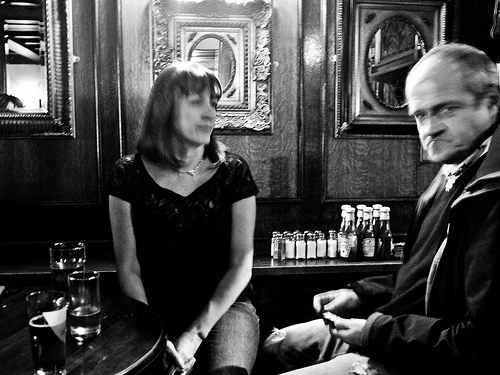
It was emotional.
The Wheatsheaf - outside view...

This is the exact spot where Julian Maclaren-Ross held court for so many years in The Wheatsheaf pub...

One of the great services Julian Maclaren-Ross renders in his best-known book, Memoirs of the Forties, is to grant life to occupants of his world beyond the numerous noted writers and artists of his acquaintance. So along with Dylan Thomas, Cyril Connolly and Graham Greene, he lends forgotten characters a substance and complexity which elevate them from bit-player status. His sense of colour, back story and telling details are all illustrated in this excerpt, in which describes one of his fellow regulars at the The Wheatsheaf:
Curtain-up on the evening was signalled by the arrival on the dot of six of Mrs Stewart, who lived on her old-age pension in one of the tenements at the foot of the alley and was collected by her married daughter towards closing time or when the pub became too noisy. Mrs Stewart was a very small elderly lady dressed in black silk with yellow-white hair and she arrived always carrying two evening papers in which to do the crossword and an alarm-clock to time herself by. She always drank bottled Guinness and having assembled her alarm clock, evening papers, spectacle case, purse, and other properties on the table, sat in front of them on a leather-covered bench which ran along the right-hand wall by the corner of the bar.
It was in this corner, propped up against the wooden partition of the seat, that I stood for many years (though not, as has been said, underneath my own tartan), having displaced from this strategic position a Central European sports writer on a daily picture paper by the simple expedient of arriving each evening earlier than he was able to.
The sports writer was furious and hated me virulently because of this, since for years before my arrival on the scene he’d been able to lean there, wearing a brown porkpie hat and camel hair coat of inferior quality, speaking to few but hoping always that tourists would say: ‘Who is that interesting-looking foreign man over there?’ as he struck a Napoleonic pose and stared superciliously ahead with his pouched eyes through the smoke of a nonchalantly puffed-at cigarette.
Having permanently dislodged him however (for if prevented by business from getting there in time, I would have someone else to hold the corner), it became my duty in turn to keep Mrs Stewart’s place, to pass over the Guinness in exchange for the exact money produced from her purse, and to see that well-intentioned idiots did not try to help her with the crosswords, a thing she hated above all. Great care had to be exercised in offering her a drink, it could only be done by split-second timing when her nightly ration was running low, but she was very proud and from certain people who plonked down heartily before her an open bottle, with the words ‘Have that one on me Ma,’ she would not accept anything at all.
She was spiky and occasionally irascible. Happily she approved of me, but Dylan Thomas and the poetess Anna Wickham she could not stand at any price. Red and Frances shared, originally, her dislike of Dylan, Mona to a lesser extent (luckily, or he wouldn’t have been allowed in), but later when he had begun to broadcast they chanced to hear him on the radio and from then on nothing was too good. Mrs Stewart either didn’t own a set or was perhaps too deaf, for her opinion of Dylan always remained unchanged, despite the attempts of Red and Frances to win her over to what was now their side.
And yet she was no stranger to people of this sort. In Paris as a young woman she lived in Montparnasse where she’d known Pascin, Hemingway and Joyce, also Dennis Corrigan who’d once been my uncle’s partner on the Côte and later hanged himself with his necktie in a prison cell awaiting trial (a paperback thriller called Hangman’s Tie was found lying below the bench from which he’d kicked off).
Corrigan Mrs Stewart had mainly met on the racecourse, but her encounters with the painters and writers had been in the Paris cafés and her stories about them always ended with her saying: ‘And there they were my dear, staggering about just like you and the rest of the young fellows are doing today.’
She was unlike the other old ladies in that she never spoke of the past from a personal angle, so nobody was told what she herself had been doing in Paris at this period. Nina Hamnett, who was better at painting old people than she was with the young, did a superb portrait of her, which for some time after she died hung above the spot where for so long she’d sat, though I don’t know what happened to it in the end.
The death of Mrs Stewart – in the late Forties or early Fifties – marked, as writers of memoirs are fond of saying, the passing of an epoch, and it might have pleased her to know that she’d become a symbolic figure to a whole new generation now no longer young: for there are few former Wheatsheaf habitués whose eyes fail to light up in memory of her name.
Julian Maclaren-Ross and Mrs Stewart's spot in The Wheatsheaf...

It was emotional.
Thanks Mark, who posted on the Paul Willetts thread to tell us that Fear and Loathing in Fitzrovia is being reissued (on 13 Feb 2014 according to Amazon UK).
I read a library copy, so might have to invest in my own copy now.
And, with a spiffy new cover...
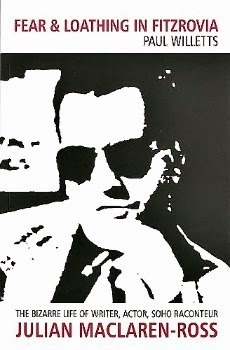
Listen to what the man said...
Mark wrote: "Good news for those with a gap on their shelving where most decent people file their copy of Paul Willetts' biography of Julian Maclaren-Ross, 'Fear & Loathing In Fitzrovia' - Feb 2014 sees the much-needed return to print. In short, it's a brilliant book and should appeal to everyone in this group. "
Joy is unconfined.
I read a library copy, so might have to invest in my own copy now.
And, with a spiffy new cover...

Listen to what the man said...
Mark wrote: "Good news for those with a gap on their shelving where most decent people file their copy of Paul Willetts' biography of Julian Maclaren-Ross, 'Fear & Loathing In Fitzrovia' - Feb 2014 sees the much-needed return to print. In short, it's a brilliant book and should appeal to everyone in this group. "
Joy is unconfined.
 When worlds collide...
When worlds collide...Happy New Year, Nigeyb. Came across a fun fact for you...Was browsing Nancy Mitford on Amazon UK, and saw a Penguin anthology of 'some' novels (not the big, complete collection), looked inside to see what was included and found this tid-bit from Philip Hensher's intro:
"In 1956, at the height of the vogue for her books, Julian MacLaren-Ross published a vicious parody of her...The parody is called 'The Pursuit of Fame.'"
Here's the link - it's right at the beginning of the 'look inside' feature--sorry I don't know how to copy from Amazon...too lazy to type it all up. :D
http://www.amazon.co.uk/Climate-Novel...
I couldn't find any references to the complete essay by googling, don't know if it's available in any of his collected works (unfortunately they don't have the look inside feature.)
Fun Fact #2 - If you google Julian MacLaren Ross and Nancy Mitford, Nigeyb's Booklikes blog is on the first page on both google.com and google.co.uk.
Cheers!
^ Thanks Miss M. Happy new year to you too.
That's wonderful. I'll have a good look at that later today and report back. It's no surprise that JMR would viciously parody Nancy Mitford. I have a fascination with the Mitfords but it is of a slightly appalled, Luke Haines-ian nature, rather than any kind of admiration. Fascinating all the same. Endlessly so - as is the era that spawned them.
That's wonderful. I'll have a good look at that later today and report back. It's no surprise that JMR would viciously parody Nancy Mitford. I have a fascination with the Mitfords but it is of a slightly appalled, Luke Haines-ian nature, rather than any kind of admiration. Fascinating all the same. Endlessly so - as is the era that spawned them.
This link takes you to the section Miss M references above on Google books
Having now read it I notice the writer concludes that JMR's parody is wide of the mark, and having read the excerpt I have to agree. I've not read Love in a Cold Climate yet but, many seem to think, it's one of her two best novels. She is undeniably a good writer and, along with Evelyn Waugh is the best I have encountered so far at evoking that particular English aristocratic between-the-Wars social milieu.
Thanks again Miss M.
By the by, I recently finished The Age of Illusion: England in the Twenties and Thirties, 1919-1940, and very much enjoyed it. You may remember you recommended it to me.
Having now read it I notice the writer concludes that JMR's parody is wide of the mark, and having read the excerpt I have to agree. I've not read Love in a Cold Climate yet but, many seem to think, it's one of her two best novels. She is undeniably a good writer and, along with Evelyn Waugh is the best I have encountered so far at evoking that particular English aristocratic between-the-Wars social milieu.
Thanks again Miss M.
By the by, I recently finished The Age of Illusion: England in the Twenties and Thirties, 1919-1940, and very much enjoyed it. You may remember you recommended it to me.
 It was interesting to stumble across the two worlds crossing paths...would still like to read the complete essay/parody one of these days; will keep an eye out.
It was interesting to stumble across the two worlds crossing paths...would still like to read the complete essay/parody one of these days; will keep an eye out.(And I know just what you mean by fascination, not admiration.)
Glad you enjoyed 'The Age of Illusion' - I'll get around to a reread eventually, but probably not for a few years. Still have Akenfield on the TBR. For me, one 'fascination' spurred by the book was Lord Reith of the BBC...ended up reading his diary plus a bio.
...Eccentric, to put it politely...
Y'all must have something in the water over there...
*grins*
I've now read about 75% of "Little Wilson and Big God" by Anthony Burgess and it includes some great descriptions of JMR and the Fitzrovian literary scene.
Burgess used to drink in the Wheatsheaf for a period during the war. He speaks very highly of JMR and his work. He is also clearly quite impressed by him as a person. This section only covers about five or six pages however the whole autobiography is, in my opinion, well worth a read.
Burgess used to drink in the Wheatsheaf for a period during the war. He speaks very highly of JMR and his work. He is also clearly quite impressed by him as a person. This section only covers about five or six pages however the whole autobiography is, in my opinion, well worth a read.
Prior to reading Little Wilson and Big God: The First Part of the Confession by Anthony Burgess, the only other book I'd read by Anthony Burgess was "A Clockwork Orange".
I was inspired to read Little Wilson and Big God: The First Part of the Confession, having come across a short extract, photocopied and framed on the wall of The Wheatsheaf pub in Rathbone Place, London. Here it is...
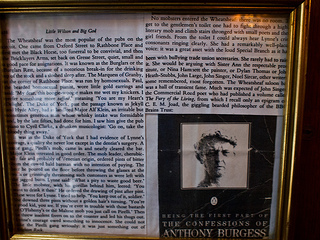
Full size here
Anthony Burgess was once a customer at The Wheatsheaf and he was describing the era in the 1940s when both he and Julian Maclaren-Ross were regulars.
It was a desire to read this particular section (probably only six or seven pages in total) that prompted me to read it.
I should add that Burgess was gratifyingly complimentary about the work of Maclaren-Ross and brings that era beautifully to life.
Recommended Hamilton-ians and Ross-ites.
I was inspired to read Little Wilson and Big God: The First Part of the Confession, having come across a short extract, photocopied and framed on the wall of The Wheatsheaf pub in Rathbone Place, London. Here it is...

Full size here
Anthony Burgess was once a customer at The Wheatsheaf and he was describing the era in the 1940s when both he and Julian Maclaren-Ross were regulars.
It was a desire to read this particular section (probably only six or seven pages in total) that prompted me to read it.
I should add that Burgess was gratifyingly complimentary about the work of Maclaren-Ross and brings that era beautifully to life.
Recommended Hamilton-ians and Ross-ites.
 I am delighted Patrick Hamilton and Hans Fallada have been brought together. They shared so much, as people and as authors.
I am delighted Patrick Hamilton and Hans Fallada have been brought together. They shared so much, as people and as authors.I ran Libris, which first republished Fallada ('The Drinker', in 1989, and 'Little Man – What Now?' in 1996).
'Hangover Square' was first published in German in 2005.
Nick Jacobs
Another somewhat tenuous connect to our man JMR, but that's all the excuse anyone needs.
I have just finished...

A Question of Upbringing by Anthony Powell
"A Dance to the Music of Time" is a twelve-volume cycle of novels by Anthony Powell, and "A Question of Upbringing" is the first of the twelve volumes.
I've wanted to read "A Dance to the Music of Time" since discovering that Julian Maclaren-Ross features somewhere in the series as a character called X. Trapnel. Such is my interest in Julian Maclaren-Ross (I am, of course, assuming you have already read "Fear and Loathing in Fitzrovia: The Bizarre Life of Writer, Actor, Soho Raconteur Julian Maclaren-Ross" by Paul Willetts) that this is sufficient to inspire me to tackle one of the longest works of fiction in English literature. You probably feel exactly the same.
Published in 1951, "A Question of Upbringing" is the reminiscences of Nick Jenkins (presumably based on Powell himself) who recounts his last few years at public school around 1921, a summer spent in France, and then onto university. It's a familiar world of gilded privilege, akin to the early sections of "Brideshead Revisited", though with very little by way of drama or narrative. Instead the reader is introduced to a variety of disparate characters and some prescient anecdotes. I say prescient as Jenkins hints at the ways in which their lives will turn out.
What makes this book a delight is the beautiful writing, which really captures the era and milieu, aligned to regular doses of humour. Powell captures the transition of adolescence into adulthood perfectly: the insecurities, the naivety, the fast changes, the gaucheness, the way friendships may evolve and fracture, and how life choices made at this stage can shape whole lives.
I suspect this series will get better and better and "A Question of Upbringing" lays the groundwork for what it is to follow. I cannot wait to find out.
4/5
I have just finished...

A Question of Upbringing by Anthony Powell
"A Dance to the Music of Time" is a twelve-volume cycle of novels by Anthony Powell, and "A Question of Upbringing" is the first of the twelve volumes.
I've wanted to read "A Dance to the Music of Time" since discovering that Julian Maclaren-Ross features somewhere in the series as a character called X. Trapnel. Such is my interest in Julian Maclaren-Ross (I am, of course, assuming you have already read "Fear and Loathing in Fitzrovia: The Bizarre Life of Writer, Actor, Soho Raconteur Julian Maclaren-Ross" by Paul Willetts) that this is sufficient to inspire me to tackle one of the longest works of fiction in English literature. You probably feel exactly the same.
Published in 1951, "A Question of Upbringing" is the reminiscences of Nick Jenkins (presumably based on Powell himself) who recounts his last few years at public school around 1921, a summer spent in France, and then onto university. It's a familiar world of gilded privilege, akin to the early sections of "Brideshead Revisited", though with very little by way of drama or narrative. Instead the reader is introduced to a variety of disparate characters and some prescient anecdotes. I say prescient as Jenkins hints at the ways in which their lives will turn out.
What makes this book a delight is the beautiful writing, which really captures the era and milieu, aligned to regular doses of humour. Powell captures the transition of adolescence into adulthood perfectly: the insecurities, the naivety, the fast changes, the gaucheness, the way friendships may evolve and fracture, and how life choices made at this stage can shape whole lives.
I suspect this series will get better and better and "A Question of Upbringing" lays the groundwork for what it is to follow. I cannot wait to find out.
4/5
 How are you planning to deal with the additional eleven volumes?! Will you take a stab at them? I'm thinking of picking this one up, but a bit daunted by the prospect of getting addicted and obsessively reading twelve volumes... this sort of thing tends to happen in my life with frightening regularity, to the exclusion of everything else! Ah, well... human interaction be damned!
How are you planning to deal with the additional eleven volumes?! Will you take a stab at them? I'm thinking of picking this one up, but a bit daunted by the prospect of getting addicted and obsessively reading twelve volumes... this sort of thing tends to happen in my life with frightening regularity, to the exclusion of everything else! Ah, well... human interaction be damned!By the way, I've just ordered a copy of 'This Little Ziggy'... thanks for the enthusiastic recommendation!
^ Hi Mark, Yes, I'm going to read them all, in sequence, but not successively, probably over the next 12-18 months.
I'm not totally sure it'll be your type of thing, I'm not saying it won't be, just that I don't know enough about what you like to give it an unequivocal "you will love this book" recommendation...
...This Little Ziggy on the other hand, I can say with virtual certainty, you will really enjoy.
I'm not totally sure it'll be your type of thing, I'm not saying it won't be, just that I don't know enough about what you like to give it an unequivocal "you will love this book" recommendation...
...This Little Ziggy on the other hand, I can say with virtual certainty, you will really enjoy.
 Fair point, really! I'll give the first volume a try, and decide afterwards. It's been on my radar for quite a while, just never managed to take the plunge.
Fair point, really! I'll give the first volume a try, and decide afterwards. It's been on my radar for quite a while, just never managed to take the plunge.
 Mark,
Mark,If by chance you're on kindle I'd be happy to lend it to you...
I have mixed feelings about the whole thing - tried many times over the years to get started, without success, then finally made it through the first two last year.
Volume I involved a lot of gritting my teeth and just pushing through - I just kept waiting for any kind of plot to get started. And yet...I actually left it unrated since it's definitely well-written just didn't do much for me. Vol 2 was better, IMO, but still a lot of meandering. But I've bought the first six, and come hell or high water I'm determined to make it at least that far. I'm hopeful it will become somewhat more interesting as the historical times and characters become more compelling.
 Many sincere thanks for your kind offer, Miss M, but I'm still strictly an ink and paper sort of fellow. Okay, okay... I'm a complete luddite, I'll admit it!
Many sincere thanks for your kind offer, Miss M, but I'm still strictly an ink and paper sort of fellow. Okay, okay... I'm a complete luddite, I'll admit it!I have serious doubts as to whether twelve volumes of ANYTHING can be written without copious amounts of meandering. I'll try the first volume at some point, and hope it doesn't try my patience!
 It's definitely worth a try, Mark - and I understand about the kindle, I resisted for a long time. I still do half and half, especially since a lot of books I'm interested in are out of print and I have to find used copies.
It's definitely worth a try, Mark - and I understand about the kindle, I resisted for a long time. I still do half and half, especially since a lot of books I'm interested in are out of print and I have to find used copies.
I mentioned this elsewhere however it also seems relevant to post in ton our official JMR thread. I am now well underway with...
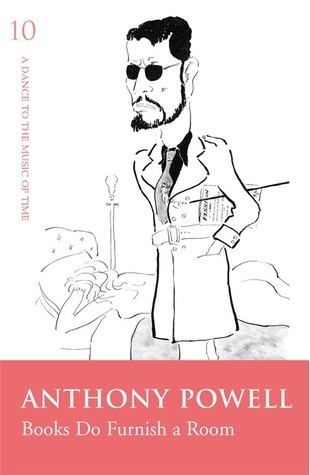
Books Do Furnish a Room (1971) the tenth of Anthony Powell's twelve-novel sequence A Dance to the Music of Time
Already my heart is heavy at the prospect of coming towards then end of this magnificent piece of literature. One of the best things I have ever read and a work I will be revisiting in the future.
Books Do Furnish a Room takes place in 1946 and 1947.
The book is most noteworthy in my world for the introduction of X. Trapnel, famously based upon our man Julian Maclaren-Ross.
Julian Maclaren-Ross is the cover star of some additions, including the one I have added above (which you should be able to see if you are reading this on a computer).
It is strange to read an evocation of England immediately after World War Two, a period that doesn't appear to feature too often in literature (in contrast to the pre-War years and the war itself).
As with other volumes, there is so much to enjoy not least X. Trapnel who, based on my knowledge, is a fairly faithful rendition of Julian Maclaren-Ross and his associated strengths and foibles.

Books Do Furnish a Room (1971) the tenth of Anthony Powell's twelve-novel sequence A Dance to the Music of Time
Already my heart is heavy at the prospect of coming towards then end of this magnificent piece of literature. One of the best things I have ever read and a work I will be revisiting in the future.
Books Do Furnish a Room takes place in 1946 and 1947.
The book is most noteworthy in my world for the introduction of X. Trapnel, famously based upon our man Julian Maclaren-Ross.
Julian Maclaren-Ross is the cover star of some additions, including the one I have added above (which you should be able to see if you are reading this on a computer).
It is strange to read an evocation of England immediately after World War Two, a period that doesn't appear to feature too often in literature (in contrast to the pre-War years and the war itself).
As with other volumes, there is so much to enjoy not least X. Trapnel who, based on my knowledge, is a fairly faithful rendition of Julian Maclaren-Ross and his associated strengths and foibles.
A new book about our main man Julian Maclaren-Ross was published in June 2016. It's called 'The Quest for Julian: The Life and Times of Julian Maclaren-Ross' by Peter Apap Bologna....
Julian Maclaren-Ross shares with Evelyn Waugh the distinction of having written the best stories of British army life in the Second World War. He did not just write well, he wrote stylishly and became one of the best-read writers and critics of his time.
Julian was one on the first to write about ordinary people and may be considered the precursor of Amis, Sillitoe, Braine, Storey, and the other 'proletarian' writers, and 'Angry Young Men' of the 1950s and after.
Unlike Waugh, Julian did not produce a body of major novels to ensure his position in the literary firmament but, without doubt, his contribution to English literature was substantial.
There were several distinct phases to Julian's life, and he wrote of each in suitably distinctive styles. His childhood in seaside towns in England and in the south of France; his early adulthood; his time in the Army; a promising period in London s Soho and Fitzrovia, working with Dylan Thomas; and a short interlude in Oxford.
Why is Julian Maclaren-Ross important? Possibly because his impressions of his own life and times are depicted by him with honesty, accuracy, and an ironic detachment.
Peter Apap Bologna's interest in Julian Maclaren-Ross started in the late 1980s, when he was putting together a collection of first editions of 1940s fiction.
Enthralled by Memories of the Forties, Julian's last and posthumously published work, Peter soon became totally involved in his life and writings, and over the years put together a mostly complete collection of Julian's work inc. Horizon, TLS reviews, contributions to Punch, and The London Magazine.
Peter was born in Malta in 1941, and educated at St Aloysius' College. He lives in Sliema, Malta with his wife Alaine and his spaniel Missie.
Pretty expensive. £30 is the standard price but plenty of copies available for around £20. Needless to say, sad obsessive that I am, I have splashed the cash. There are three effusive reviews on Amazon but none here. Not surprising as it was not here until I added it myself.
Those reviews...
A compliment to Paul Willetts's biography which is especially fascinating on the Fitzrovian circles in which Maclaren-Ross mixed. Bologna quotes extensively from the writing to demonstrate that Maclaren-Ross is a writer who deserves to be better known.
Wonderful book about the great writer, packed with enthusiasm, stuffed with quotes, and an excellent read written, it feels by one of McLaren Ross's greatest fans. Though after reading anything by Julian McL R, who wouldn't be a fan?
The title of Peter Apap Bologna’s new book led me to expect a “Quest For Corvo”-type biographical detective story, but his approach could hardly be further removed from that. He has, instead, provided us with a warm-spirited, thematically-based collage that evokes the rackety life and often under-rated writing of Julian Maclaren-Ross.
I'll let you know what I make of it. Hard to imagine how it could add much more than the splendid biography by Paul Willetts though.
Lovely cover though innit...
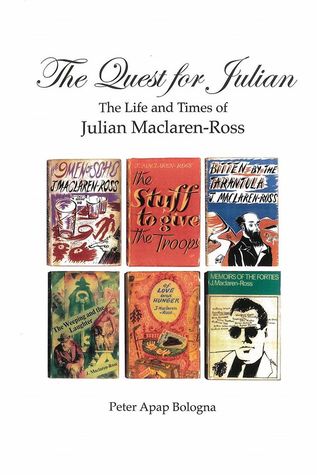
Julian Maclaren-Ross shares with Evelyn Waugh the distinction of having written the best stories of British army life in the Second World War. He did not just write well, he wrote stylishly and became one of the best-read writers and critics of his time.
Julian was one on the first to write about ordinary people and may be considered the precursor of Amis, Sillitoe, Braine, Storey, and the other 'proletarian' writers, and 'Angry Young Men' of the 1950s and after.
Unlike Waugh, Julian did not produce a body of major novels to ensure his position in the literary firmament but, without doubt, his contribution to English literature was substantial.
There were several distinct phases to Julian's life, and he wrote of each in suitably distinctive styles. His childhood in seaside towns in England and in the south of France; his early adulthood; his time in the Army; a promising period in London s Soho and Fitzrovia, working with Dylan Thomas; and a short interlude in Oxford.
Why is Julian Maclaren-Ross important? Possibly because his impressions of his own life and times are depicted by him with honesty, accuracy, and an ironic detachment.
Peter Apap Bologna's interest in Julian Maclaren-Ross started in the late 1980s, when he was putting together a collection of first editions of 1940s fiction.
Enthralled by Memories of the Forties, Julian's last and posthumously published work, Peter soon became totally involved in his life and writings, and over the years put together a mostly complete collection of Julian's work inc. Horizon, TLS reviews, contributions to Punch, and The London Magazine.
Peter was born in Malta in 1941, and educated at St Aloysius' College. He lives in Sliema, Malta with his wife Alaine and his spaniel Missie.
Pretty expensive. £30 is the standard price but plenty of copies available for around £20. Needless to say, sad obsessive that I am, I have splashed the cash. There are three effusive reviews on Amazon but none here. Not surprising as it was not here until I added it myself.
Those reviews...
A compliment to Paul Willetts's biography which is especially fascinating on the Fitzrovian circles in which Maclaren-Ross mixed. Bologna quotes extensively from the writing to demonstrate that Maclaren-Ross is a writer who deserves to be better known.
Wonderful book about the great writer, packed with enthusiasm, stuffed with quotes, and an excellent read written, it feels by one of McLaren Ross's greatest fans. Though after reading anything by Julian McL R, who wouldn't be a fan?
The title of Peter Apap Bologna’s new book led me to expect a “Quest For Corvo”-type biographical detective story, but his approach could hardly be further removed from that. He has, instead, provided us with a warm-spirited, thematically-based collage that evokes the rackety life and often under-rated writing of Julian Maclaren-Ross.
I'll let you know what I make of it. Hard to imagine how it could add much more than the splendid biography by Paul Willetts though.
Lovely cover though innit...

 Thanks for pointing this one out, which had completely escaped my radar. Hopefully, the UK has another upcoming vote which will result in the further plummeting of the pound sterling, thus making this book more affordable to those of us with stateside dollars in our pockets.
Thanks for pointing this one out, which had completely escaped my radar. Hopefully, the UK has another upcoming vote which will result in the further plummeting of the pound sterling, thus making this book more affordable to those of us with stateside dollars in our pockets.Will look forward to your thoughts after you read this.
I must say, though... my initial reaction, which I can't seem to shake, is that I'm quite content to let Paul Willetts' biography stand as the last word on the subject. I suppose that 'Fear & Loathing in Fitzrovia' could be complemented, though I can't imagine it could be bettered.
Brilliant jacket design on this one, though, and no two ways about it.
I managed to get a new copy for £19 incl p&p from eBay. A lot of money, and far more than I would usually pay for a book. Actually most of the books I buy I don't even keep - though will probably make an exception for 'The Quest for Julian: The Life and Times of Julian Maclaren-Ross' assuming it's even slightly good, which I feel sure it will be, though as you say Mark, unlikely to top the wonderful Willetts biog.
Books mentioned in this topic
The Military Orchid (other topics)The Orchid Trilogy (other topics)
Of Love and Hunger (other topics)
Of Love and Hunger (other topics)
Of Love and Hunger (other topics)
More...
Authors mentioned in this topic
Jocelyn Brooke (other topics)Peter Apap Bologna (other topics)
Julian Maclaren-Ross (other topics)
Julian Maclaren-Ross (other topics)
Peter Apap Bologna (other topics)
More...





Mark inspired this thread with this comment in the Hangover Square thread...
Mark wrote: "I first arrived at Patrick Hamilton, in general, and 'Hangover Square' in particular, via 'Of Love & Hunger' by Julian MacLaren-Ross. If you're a fan of Hamilton's, and have not read Maclaren-Ross, I can recommend 'Of Love & Hunger' with supreme confidence. Further, 'Fear & Loathing in Fitzrovia' -- Paul Willetts' biography on Maclaren-Ross -- is brilliant and wholly engaging. "
This is what Goodreads has to say about Julian Maclaren-Ross...